#the only other labels i can think of that break the split gender-sexuality model are ones like butch & femme
Text
when i call myself queer i’m rejecting not only the split attraction model but the model that delineates sexuality from gender identity. my asexuality is inextricable from my aromanticism is inextricable from my lack of gender; each is just an extension of the others. there aren’t a lot of labels that do that so i’m attached to the one i have
#the only other labels i can think of that break the split gender-sexuality model are ones like butch & femme#which obviously don't apply to me#it would be nice to have something more specific but otoh queer is kind of rejecting labels so i'm cool with that#this isn't slur d!scourse just late night musings#ace tag#aro tag#trans tag#queer#lore#bri.txt
6 notes
·
View notes
Note
Hi! I’ve identified as bisexual since 2020 and i even came out to 2 irl friends, and i kind of regret it now because i’m not entirely confident about my bisexuality. I have tried to make myself “fit in” in the ways other people describe their bisexuality and especially the way they’re attracted to women, but i have realised that’s not me. I also started reading plenty of WLW comics to see if i feel something but even if I do, it’s never nearly as strong as the way i feel towards men.
I am curious about dating women, having sex with them and how all that would be like. I’m pretty sure i do feel sexual attraction towards women but i’m not so sure about romantic feelings. I know about the split attraction system but i don’t want to be heteromantic bisexual, it makes me feel like a creep.
I’ve seen that a lot of comments towards gay people are like “how do you know if you have never tried it” and the answer is that straight people know they’re straight even if they haven’t dated anyone before. I feel like with women that’s not the case for me, that i’ll never be sure unless i date one but im scared of being judged, “tainting myself” with a queer label when im not actually queer, and afraid of breaking someone’s feelings. Does this make me not bi, if i need to date someone to be sure?
Does it make you bi if you feel the need to date someone to be sure? Honey, that's not what it's about. Why would that be "less valid" than someone who is 1000% sure without having the experience of dating a specific gender? If anything I'd say this is a reflection of your honest desire to make that experience. You know... a straight women usually doesn't feel the need to try dating another woman.
But more importantly you said the crucial thing yourself, may I quote: "I am curious about dating women, having sex with them and how all that would be like. I’m pretty sure i do feel sexual attraction towards women..." That's it. That's all you need to call yourself bisexual if you like the label. And furthermore the split attraction model is helpful to some people and anyone who finds empowered by that is welcome to use it. But for some people that doesn't work or they find it too complicated or like it doesn't fully fit their identity either. So you do not have to use a split-attraction identity if you don't want to. You can just call yourself bisexual if you recognise your potential to be attracted to more than one gender. That attraction does not have to be identical for the genders that you are attracted to. But anyone who does go with heteroromantic/bisexual isn't "a creep". Why would they be? If you think that sexual attraction without romantic feelings is inherently "creepy" or "bad" then I'd recommend trying to unpack that because it doesn't sound like a healthy understanding of sexual attraction to me. Sex and sexual desire isn't an inherently bad thing that needs to be "purified" by adding romantic feelings. Thus, even if your attraction to women is only sexual and you don't ever want to romantically date a woman then you are still bi and it would be perfectly fine for you to explore that sexual desire with someone. As long as you are honest about your intentions and lack of romantic interest, there is nothing unethical about it.
Actually a lot of bisexuals experience attraction differently. Some of us have a preference for one gender, some have a stronger romantic interest in one gender than in another but sexually it's equal. For some bisexuals there is a more intense sexual desire for one gender whereas they might lean towards another gender romantically. There isn't just one way to be bisexual and after all "bisexual" is just a word that tries to describe something very complex. Human sexuality is sometimes a lot more complicated than a single word can describe so you should think of any sexuality label as an approximation. The function of those labels is to find a community and to communicate something about yourself. It isn't meant as a restriction or as something you have to fit into. Instead you should make the label fit you. If you cannot relate to someone else's personal experience of being bisexual that doesn't mean you have to try and "copy" them or that you are not bisexual as well in your own individual way. I'm mostly just reading a lot of internalised biphobia in your message. You are doubting yourself and are afraid of not being "queer enough" because you think you don't fit into a very selective narrative of what it means to be a wlw.
So lastly I'd like to point out that there are many ways to be bi/queer/sapphic that aren't represented, that are invisible... especially bisexual women's love for men (and likewise, bi men's love for women) get swept under the rug as being "too straight". But that's biphobia. We are always bisexual aka always queer and not-straight by virtue of being bi. Even when we are attracted to the so-called """opposite""" gender. And the fact that you cannot relate to wlw stories (which often tend to be lesbian stories, let's be real) doesn't surprise me at all. Personally, I am right there with you on that. Not only am I barely ever interested in stories just for the sake of "representation" (either a story is interesting or not, whether it has queers in it is not a priority for me, might just be an added bonus); I also don't mingle in sapphic/wlw communities precisely because I cannot relate to it and I am not interested in communities that are gender-exclusive. Does that make me less queer than a bisexual woman who enjoys going to "lesbian" events? No. It just means she has different interests than me. And maybe it means she has a preference for women. But so what? A bi woman without a preference or even a bi women who prefers men is still 100% bisexual. We aren't "lesbian lite" and we do not have to pretend to be that. It is fine to be attracted to men, as much as you want. It's also fine to enjoy that. You do not have to play it down or pretend like it's an unfortunate side-effect of bisexuality.
Try not to force your sexuality into fitting other people's definitions and experiences. Just try to let things flow, feel attractions as they occur and pursue those that feel good and exciting. Do the things you are curious about and see if those experiences change anything about your perception of self or not. And in the meantime, if you want to identify as bisexual then go for it. Nothing in your message sounds to me like you shouldn't or couldn't.
Maddie
#very long reply#sorry#I feels like something was building up#with how little asks we've been getting lately
20 notes
·
View notes
Text
Asexuality and Me (It's Kind of a Long Story) by @darcyshire
I had my first boyfriend when I was in my early teens. He was a good friend, we got along very well, and he remains to this day very special to my heart. We were together for just a few months — not so uncommon for a junior high relationship — and I broke up with him because I was pretty sure he was going to try to kiss me. Not anything more than that, nothing “too far” for a pair of 13-year-olds, but that was too much for me. I apologized profusely, and he was upset because he didn’t understand what the issue was — because I couldn’t tell him. It sounded so dumb.
I had a few more boyfriends in the next couple years, and every time it was the same: if I felt that things were moving past holding hands or hugs, I ended the relationship. I was a serial dumper, never the “dumpee”.
When I made it to high school, I had a group of friends, some of whom identified as lesbians. I was intrigued by the comfort they had in their relationships with other girls, so I wondered, “Am I maybe gay, and that’s why I keep breaking up with boys?” I thought about it and realized that no, I did often find myself having crushes on boys I knew well and enjoyed the company of. I also had those feelings for a few girls I knew well. I toyed with “bisexual” as a label, and used that privately, in my own head only, until I came across the term “pansexual” online, which I felt was a perfect description of the feelings I was having (minus the sex part). Gender didn’t matter when it came to crushes; I liked who I liked, and that was that.
When I had my first “real” boyfriend, I was 15. He asked before he kissed me the first time, and it turned out that I didn’t hate it. I did hate when he brought up sex. At the time, I was involved in my church, and I was opposed to sex outside of marriage, so the idea of going against that was upsetting. I wanted him to stay with me, so I went along with some of what he wanted — and it made me feel disgusting. Same thing with my next boyfriend; I dreaded anything to do with sex. I thought about whether it might feel different if I was with a girl instead, but with my involvement in a fairly conservative church community, I felt it wasn’t safe to try.
When I met my now-husband, I felt none of the pressures I had felt before. He quickly became my best friend, and we got along incredibly well. He and I had similar values when it came to saving sex for marriage, so I didn’t have to worry about that aspect of our relationship. We dated for 4 years before we got married, and I was absolutely, 100% sure that marrying him was what I wanted, and what would make me happy. Our pre-marital counsellor had asked if waiting for sex had been difficult; my husband said yes, and I said absolutely not. I truly spent no time thinking about it. As our wedding date approached, however, I started to get very anxious. So much so that my own therapist suggested not “doing the deed” on our wedding night, to take the pressure off and make the experience less nerve-wracking. (I ignored her recommendation, and everything went mostly fine.)
For the first few weeks of our marriage, I was pretty indifferent about sex. I wasn’t interested in it, but my husband was, so I participated at his request. It wasn’t exciting or enjoyable for me, but it wasn’t something I was terrified of until a few months later, when I started having feelings of deep distress afterwards. I would wait for him to fall asleep, and would go out into our living room and cry; sometimes I had thoughts about self-harm or suicide. I became deeply depressed (more than I had ever been before, as depression has been a part of my life for many years), and my husband noticed that I was never initiating intimate experiences. We were married in August 2019, and the last time we had sex was February 2020, because I just couldn’t handle it. I couldn’t stop asking myself what was wrong with me. What was broken? Was it because of my previous relationships? Was my depression making me frigid? (Of course, I never considered the fact that sex had been of no interest to ever, even when everyone around me was thinking about it constantly).
[This is a long story, so my apologies that it’s a bit rambling. Now to the good stuff!]
I was scrolling Tumblr in the early months of 2020, and I came across the term “asexual”. I’d not really heard much about it before, but from the short description, it seemed like it fit my experience. I did some online searches, and came across a document from AsexualityArchive.com called “Asexuality: A Brief Introduction.” I read the whole thing in an afternoon and found myself literally crying, because I felt so relieved. I learned that day that there was nothing wrong with me, that there were other people who also had no interest in sex — some were even repulsed by the very idea of taking part in sexual experiences, like I was. I told my husband, fearing he would leave me, and he was incredibly loving, gracious, and accepting. He loves me for my personality, not for what I can offer him sexually.
I started using the label “asexual”, (‘ace’ for short), and felt really comfortable in that. When I learned about the split-attraction model that many aspec folx use, I changed my labels to “panromantic/asexual” (pan-ace), because that fit even better. When I began to question my own experience of gender and sexuality, and got involved with the rainbow community, I decided that “queer ace” was the best fit of all, and that’s where I’m at today. I’ve come out to my family as queer, and was unfortunately outed to my husband’s (conservative Christian) family before I was ready, but after the fact, I am glad the people closest to me know that being queer is am important part of my identity.
Only my husband, my mom, and a few close female friends know about my asexuality (outside of the online queer communities I’m a member of), because I’m tired of hearing people say things like, “maybe it’s just your depression”, or “you should see your doctor about that”. Plus, it’s mine and my husband’s private business how we conduct our sex life, not anyone else’s. I didn’t know there was a word for people like me until early 2020, but I’ve been ace my whole life; looking back on things now, I can find many indicators of asexuality starting from before I was even a teen.
I’m now 24 years old and a proud member of the queer and aspec communities. I hope that my story might give hope to others who have been asking themselves why they have so little interest in sex. It’s not a defect — it’s just the way we were made. As a person of faith, this realization has meant the world to me.
#Submissions#submission#suicide mention /#self-harm mention /#darcyshire#pride month with asexual-society#pride month with a s#thank you for sharing -- and I'm so glad your husband has been supportive of you#I hope you have a good pride month and future past that
32 notes
·
View notes
Text
Someone on Reddit was asking why labels were important and I went into a whole goddamn essay because my Vyvanse is kicking in.
TLDR - Labels are important for communication. Without communication, we are isolated. Sexuality is so fundamental to our experiences as human beings that being able to describe those experiences succinctly can mean the difference between feeling isolated and feeling connected. Also sneering at ace people for microlabels dismisses the asexual experience as so unimportant that we SHOULDN'T be able to describe our exact experience of it, when discussing asexuality often requires these labels because of how varied and complicated the asexual experience is.
I've been waffling on the fence about microlabels but I've decided that no, microlabels aren't overthinking it, for the reasons I discuss below. In the past I've reblogged things saying that microlabels are about isolation instead of connection, that further dividing our sexuality into smaller and smaller boxes creates increasingly exclusive clubs.
I no longer believe that. I believe it does the opposite. I believe that being in touch with your sexuality just as much as you need to helps you connect to others even outside your microlabel, not just within it, because then it makes it clearer to everyone involved what experiences you have in common and makes it easier to set aside the ones you don't.
You don't understand how important labels are until you've struggled without one. It's human nature to use language to describe our experiences, and when we don't have the language to do so it is stressful and isolating. Because language is how we connect to other people, so when we can't use easy language to summarise our experiences, it becomes isolating.
My personal experience - I struggled with my asexuality for years, even before I began to realise that I was asexual. Even once I started letting myself admit it, I didn't feel that the word "asexual" was enough. Sure, I could explain to people "I'm asexual and don't want to have sex, but I love sex in theory and in novels and I love reading about romance and daydreaming about them, but don't want a relationship." That's a very specific type of asexuality that people don't think of when they hear "asexual". People hear "asexual" and think "doesn't like sex."
But people use labels because others don't want to stick around and listen to your dissertation on what your sexuality actually is, they want bite sized information as soon as possible and sometimes YOU want to describe who you are without spending a ton of time explaining it. It's not just because I want to understand myself, it's because I want other people to, too, and labels is how we communicate. It's the fundamentals of how language works. Labels are so important that they consist of two entire grammatical categories - adjectives and nouns.
So when I found out about aegosexuality? I was like "oh thank god, I'm not a broken asexual, I'm this specific TYPE of asexual."
Most people haven't heard of aegosexuality. I used to actually roll my eyes at microlabels like that, thinking it was needlessly self absorbed and pretentious. But now I get it. Now I have the ABILITY to summarise my experiences in one word, and it turns out that having that ability to use language efficiently to describe myself has brought me quite a significant amount of peace. Because when I tell people I'm asexual, they often have a certain idea in their heads of what asexuality is, and I don't fit under most of that. Many asexuals don't, because asexuality is the most complicated sexuality there is.
But god is it fucking exhausting to say "I'm asexual" and then have to hold a fucking Q and A session about how I'm asexual and yes, I really am asexual even though I'm not adhering to someone else's idea of what asexuality is. By knowing I'm aegosexual, I can say, "oh, you're thinking of X type of asexuality, which is when you experience Y. I'm aegosexual, which means that I still get horny and love sex in fiction, but I don't personally want to experience it, unlike X type of sexuality which doesn't like sex at ALL."
And then people get it! They don't get "I'm asexual, but different." That just makes them think I'm not actually asexual, or that I'm an allo in denial who needs therapy to be "fixed". They get "I'm asexual, but this specific type of asexuality that has a name." People respond to names. People respond to labels. They GET labels, even ones they haven't heard of, even ones they roll their eyes at because they think we're over thinking it because they assume that because their sexuality is so fucking simple, everyone else's must be too.
I still tell people I'm asexual because a lot of the time my type of asexuality isn't actually important. Actually, most of the time I tell them I'm queer and leave it vague because queer is a wonderful umbrella word and my sexuality isn't anyone's business. For me, "queer" is often enough because it communicates that my experience isn't a straight one, and that's usually all people need to know.
But having that label just on *hand* that describes my experiences, and having the option to use it to people who do know what it means, and being able to hand it to people who are lost like I used to be lost -
That's powerful. It's important. It *matters*.
It's not like needing a label for yourself because you prefer pineapple on pizza, this is sexuality, this is the kind of thing that makes or breaks your experiences with other human beings. When you're straight your sexuality is so simple and easy that you don't even need to think about it. You're straight. That's easy. And as homosexuality becomes more accepted I'm seeing baby gays start to take that attitude as well because they're gay and as homosexuality becomes less stigmatised, it's allowed to become more simple.
But other sexualities don't have that luxury.
Bisexuality and pansexuality are more complicated because often people experience a split attraction model, or they don't have equal attraction to different genders and they're not fully comfortable describing themselves as bi or pan because again, people hear "bisexual" or "pansexual" and assume that you experience the same amount of attraction to different genders and it's important to be able to communicate to people that no, you don't. The whole point of using a word is so that the other people understand you - if they don't understand the word, they don't understand YOU. So I think bisexuality and pansexuality is also a spectrum in that there's different types of both depending on how your attraction works, and that it would help bi and pan people to have more specific words - using bisexual and pansexual as an umbrella term much like queer and asexual - to allow them to better communicate their experiences.
And asexuality is, I think, the most complicated sexuality of all. It's based not just on who you're attracted to, like other sexualities, but if you're attracted at ALL. No other sexuality has a footnote attached of "but this one likes sex" or "this one doesn't like sex" or "this one is indifferent to sex". Even bisexuality and pansexuality don't. It also has the contradictory feature of involving some level of attraction - demisexuals and grey aces experience attraction! Just only under specific circumstances. The split attraction model is also much more significant; whereas some bisexual people are explicitly homo- or heteroromantic, many asexuals are not aromantic, and many aromantic people are not asexual. This is far more common with us.
It's also the ONLY sexuality where the split attraction communities are actively hostile to each other. Aromantic people have lately been slinging a lot of shit at asexual people because in their need to be told apart from us (I say "us" even though I'm aromantic myself because I'm also asexual), some have gone to the extreme of showing outright hostility to asexual people and show offence for being associated with us at all. When I thought that I was bi, for example, I NEVER saw this kind of shit between homoromantic bis, heteroromantic bis and biromantic bis. Only the asexual and aromantic community has this hostility.
I respect that aros don't want people to mistake them for asexual people and that's important for the same reasons I've been discussing in this entire essay, but here I'm referring to outright hostility aimed AT asexuals because of other people's failures to understand them. "Aromanticism isn't the same as asexuality" is not hostility. Treating asexual people like garbage - or even aroace people because they dare to exist as asexual AND aromantic - is hostility. This hostility is rising.
So asexuality is deeply complicated, and when you have completed concepts, you need simple labels to communicate that. And frankly - allos don't fucking get it. Bi and pan people do to a certain level, but their sexuality, while more complicated than being gay or straight, is still not as complicated as asexuality. That's not a bad thing, having a more complicated sexuality doesn't make us superior, nor is complication the same thing as depth. Other sexualities are not shallow for lacking the same level of complication, nor should they be taken less seriously.
But it does mean each sexuality has nuance to it that you can't understand without being that sexuality, and it's vital not to fall into the same trap straight people do that your experience of sexuality applies to everyone else, of assuming that because your sexuality isn't complicated to you that it must be the same for everyone else or we're overthinking it. And it's important for us to be able to succinctly sum up our sexuality so that we can share our experiences.
People who've never faced that don't understand how important it is to feel connected to people by being able to efficiently describe yourself. To use language is to connect, to use language and labels is to communicate. Without that, it's an isolating experience, simply because people do not fucking want to hear you bring out a PowerPoint presentation to talk about yourself when they just want one word. And when you're talking about something that defines your human experience, that makes your ability to communicate it THE difference between being isolated and disconnected, and feeling human.
Having different levels of labels helps, too. Sure, I'm aegosexual, but even if most people knew what that meant, most of the time it's completely fucking irrelevant. Most of the time all I need to do is say I'm queer - because I'm communicating that my experience isn't a straight one (or a cis one, if you're queer because of your gender). Sometimes I need to say I'm aroace, or just asexual, because that's what the conversation calls for. It's only when discussing asexuality itself that I actually need to say I'm aegosexual - but that's important, too.
Discussion of asexuality is no less important than being able to say I'm ace, or that I'm queer, and a lot of allos think that distinguishing yourself from straight people is important, that distinguishing yourself from non straight people is important, but asexuality itself is so unimportant that we're not allowed to distinguish ourselves among each other. And that's just another form of aphobia. It doesn't mean that we're going "ew, we're not THOSE asexuals" like I've been seeing in the arosexual community lately, it's being able to say "this is my experience of asexuality, so I'm viewing our discussion through THIS lens, whereas you might not."
And it's so fucking typical that allos think that that shouldn't be important to us. I regret ever thinking the same.
At the end of the day, we need language. It describes our experiences, and without being able to describe those experiences, we are isolated. We need language and labels to connect.
#Dusty has opinions#I need to stop talking on the internet when my Vyvanse kicks in#I just don't fucking stop
7 notes
·
View notes
Text
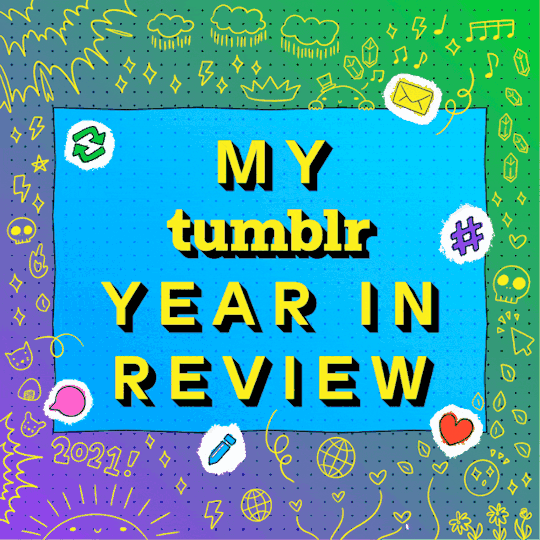
I posted 3.558 times in 2021
195 posts created (5%)
3363 posts reblogged (95%)
For every post I created, I reblogged 17.2 posts.
I added 139 tags in 2021
#anon - 73 posts
#aro - 15 posts
#queer - 10 posts
#enraged-fangirl-and-co - 9 posts
#aromantic - 9 posts
#pan - 5 posts
#ply - 5 posts
#omni - 5 posts
#aro-spec - 4 posts
#always reblog - 4 posts
Longest Tag: 140 characters
#but hey people only have a problem with 'queer' forcefully being applied to ppl or as an umbrella term for tge whole community :) totally :)
My Top Posts in 2021
#5
(For the version without coloured text click here)
If your biggest problem is the way somebody else decides to describe their sexuality, identity or expression, please get some goddamn perspective.
Are you pissed that some people identify as omni, ply, pan, multi, ambi, abro, fluid, homoflexible, heteroflexible, m-spec, etc?
Do you get mad when somebody who is into multiple genders but not into all genders - who isn't into one of the binary genders, even - calls themself bi?
Do you blame people calling themselves m-spec lesbians and m-spec gays for straight people's homophobia?
Does it piss you off to see people calling themselves homoromantic bisexual, panromantic heterosexual, etc? Do you try to stop other people from using the Split Attraction Model because you personally found it unhelpful for your identity?
Does it irk you that people call themselves, their experiences and their community queer?
Do you try to limit who can or can't use butch and femme?
Do you get mad at m-spec people calling themselves fags and dykes?
Do you hate that there's people calling themselves aro, ace, demi, aego, akoi, etc? That we don't consider ourselves "basically straight"?
Do you blame nonbinary people for cis people's transphobia?
Do labels like dittogender, chaotigender, autigender, etc annoy you?
Do you hate that people are constantly finding new ways of describing their personal experiences, new labels to use, new pronouns too?
Do you hate that there's people having fun with their identities instead of putting themselves in established, sufficiently respectable boxes?
Do you get mad at people using acronyms like QUILTBAG, MOGAI, LSBTI, LADT, HBTQ, etc? Do you harrass people from other countries over it?
If you answered "yes" to any of these, here's a reality check:
The way other people describe their identity, their experiences and their community is not for you to decide. It just isn't. You don't get a say.
The way other people describe their identity, their experiences and their community is not the cause of bigotry.
The way other people describe their identity, their experiences and their community is not tearing the community apart. You are.
The way other people describe their identity, their experiences and their community has nothing to do with you. Stay the fuck out of people's business.
In conclusion:
Why the fuck are you getting worked up over what people call themselves?
1057 notes • Posted 2021-03-28 15:09:29 GMT
#4
Do not be fooled:
There are no explicit kink scenes happening at pride
People are not having kinky public sex at pride
The "no kink at pride" discourse started because people took offense to the leather pride flag - the second oldest pride flag after the rainbow one - being displayed just as proudly as any other.
They took offense to the non-explicit kinky outfits of leather daddies, puppy players, etc. who attend pride.
They took offense to their "good clean pride" being shared with those ~dirty kinksters~ and to the implication that they are at all comparable to them.
And in their hysteria over kinky people visibly existing, they managed to convince some of you that kinksters are breaking indecent exposure laws and having public sex at pride, because you took their screaming about how "inappropriate" and "not child-friendly" those ~dirty kinksters~ are at face value.
The fact that so many of you genuinely think that the idea of kinksters engaging in these things in a huge public event like pride is realistic says a lot about how you view kinky people, tbh - and kinky gay men especially, since the made-up examples of things you don't want to see at pride are always about men.
1991 notes • Posted 2021-06-02 16:03:04 GMT
#3
Can we all just take a breath and remind ourselves that we can refuse to be referred to in a particular way without shitting on people who do like being referred to that way?
You can say you don't identify as "queer" without demonizing the queer community.
You can not want "gay" being used as an umbrella term for you without taking it away from people who do like to use it for themselves.
You can hate being called "it" without taking it out on people whose pronouns are it/its.
You can be uncomfortable being called "they" without blaming people with they/them pronouns.
You can not like neopronouns for yourself without making that the problem of people who do like them.
You can dislike having terms like "joyfriend" applied to yourself without mocking people who'd love to be called someone's joyfriend.
If you're fed up with some kind of expectation that you ought to be okay with being called any particular term, then rage at that expectation, not the term or the people who like it.
4972 notes • Posted 2021-02-06 18:56:05 GMT
#2
Sometimes your relationship with a label is more complex than "I identify with this" or "I don't identify with this" and that's fine!
"I sometimes identify with this" is fine!
"I partially identify with this" is fine!
"I don't really refer to myself this way, but I do feel included when people talk about it" is fine!
"I use this for the sake of ease even though it doesn't fit 100% 'cause I haven't found anything better yet" is fine!
"I use it 'cause it may not describe my feelings, but it does a good job of explaining how people perceive me" is fine!
"It's the closest fit when trying to find a community of people that face the same problems I do" is fine!
People are complex, your experiences don't need to neatly fit into "100% this label" or "definitely not this label". If you have a complex relationship with one or more labels, that's completely fair and I hope you have a great day.
8360 notes • Posted 2021-04-17 15:00:47 GMT
#1
What is or isn't a slur can be highly contextual, y'all.
"Jonny Sims bummed a fag off my ma" doesn't contain a slur, but "What are you, some kind of fag?" does.
"Queer studies", "the queer community" and "I'm queer"? Not a slur. Some bigot calling you a "dirty queer"? Slur.
"Be gay, do crimes" and "He's gay" ≠ slur, but "Ew, that's so gay" = slur.
In conclusion, stop buying into this fucking "q slur" bullshit. Queer people talking about the queer community aren't using it as a slur any more than a gay man calling himself gay is using that term as a slur.
62600 notes • Posted 2021-04-23 17:38:55 GMT
Get your Tumblr 2021 Year in Review →
#my 2021 tumblr year in review#your tumblr year in review#long post#really long post#I'm sorry my popular posts tend to be Long#I have opinions#they tend to be somewhat wordy
5 notes
·
View notes
Note
Hey, you seem like someone who knows stuff. Lets say, hypothetically, that I am a lesbian, and I am dating a girl who I find very attractive. But then, the girl comes out as a trans boy. Would I still be able to call myself a Lesbian if I am still attracted to him? Would I be transphobic if I broke up with him? Would I be transphobic if I DIDN'T break up with him? I have only recently come to terms with my sexuality and I don’t know frick about crap
So I asked my best friend (who is trans) for help answering this.
You wouldn’t be transphobic if you broke up with him, because not wanting to date men as a lesbian is a valid reason to break up with someone.
If you have penis repulsion that isn’t transphobic because I would put that under sexual incompatibility, but it is transphobic to not date Trans Women period because there is more to dating than sex, they are Women, and some of them have decided to get gender affirming surgery (this doesn’t give you the right to interrogate trans women about their transition status before you date them, this is a conversation to be had after several dates when you both need to decide where you want the relationship to go and how you want to get there, maybe she’s an asexual trans women who doesn’t want to have sex ever, the possibilities are endless). It’s also transphobic if you decide to add trans men to your dating pool of possible partners under the assumption that they have not had gender affirming surgery, and also if you don’t want to be with men as a lesbian then trans men are also out.
For calling yourself a lesbian: most (most, not all because trans people are not a hive mind) trans men do not want their partners to call themselves lesbians because it implies that trans men are women (and the modern use of the term lesbian generally means exclusive attraction to Women). So, you will need to have a long conversation with this hypothetical trans man about what label to use, and labels can just be made up. Labels you could use if your partner doesn’t want you to call yourself a lesbian and you want to keep dating them as explained earlier in this paragraph: queer, bisexual, biromantic lesbian, homoflexible, you can mix and match labels for romantic and sexual orientations if you want to use the Split Attraction Model. If you decide you don’t want to stop calling yourself a lesbian but this person doesn’t want their partners to refer to themselves as lesbians I think you should break up out of mutual respect for each other, as labels are personal choices and I know if I were dating someone who wanted me to stop calling myself queer/ace/on the aro spectrum I would consider breaking up with that person (my partner is accepting of my labels and me but my situation and labels are very different from yours).
-FemaleWarrior, She/They
140 notes
·
View notes
Text
Super Drags review (tl;dr Show Good)
The post where I do my best to spread the Good News, that there exists a saucy gay drag-queen magical-girl animated comedy and everyone should watch it.
Okay, not everyone -- I'll give some caveats at the end -- but definitely a heck of a lot more people than Netflix has bothered to advertise it to.
Look at this! Why did nobody tell me about this??
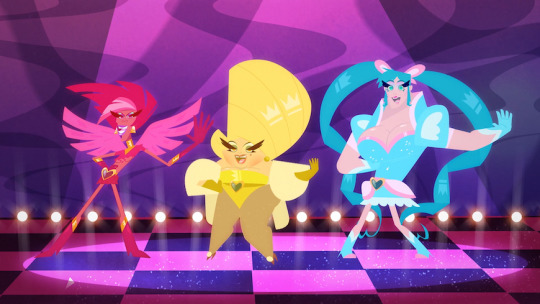

What is Super Drags?
Fast facts:
It's a 1-season, 5-episode adult animated comedy series, released in November 2018
Here's the official page, with a free-to-view trailer
It packs more explicit, unashamed queerness into those 5 episodes than any other cartoon I can think of
The only possible competitor would be if you took the whole 5000-episode run of Steven Universe and pared it down to a supercut of Just The Gay Parts
This in spite of being produced in Brazil, which (in my broad understanding, as a total non-authority on the subject) is more oppressively, dangerously homophobic than the US
The original is in Portuguese
There is an English dub, fabulously voiced by contestants from RuPaul's Drag Race
It's wrapped in "for adults only!" warnings, not because the content is any less child-friendly than (say) your Bojacks Horsemen or your Ricks and Mortys, but because Brazilian authorities tried to get it shut down on the grounds of this much gay being Harmful For Children
It was (heartbreakingly) not renewed for a second season
Here's a promo video, in which the main characters (Portuguese, with subtitles) play Drag Race judges for Shangela, who ends up voicing Scarlet in English.
And here's a beautiful flashy music video of the big musical number! (Also Portuguese, no subtitles, but the melody and the visuals stand on their own.)
Plot and worldbuilding stuff!
The elevator pitch is "What if Charlie's Angels, but also drag queens, with superpowers, because magical-girl transformations?"
In this universe, all LGBTQ people have magical energy. The Big Bad is an evil magical-drag-queen nemesis who tries to drain our energy for her own purposes. It's like if Ursula from The Little Mermaid was a first-season Sailor Moon villain.
...sidenote, in case you were worried, the representation isn't "cis gay men and nobody else." There's a butch lesbian in the recurring cast, a genderfluid person (in that specific word!) as a one-off love interest, and all the ensemble scenes are wonderful collages of different races, body types, and gender presentations.
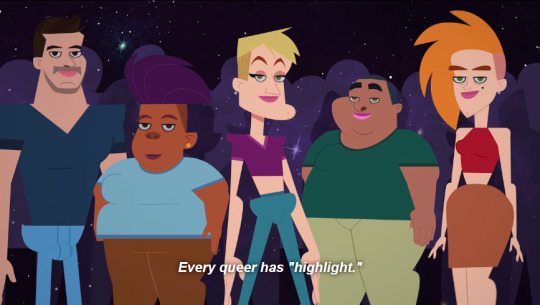
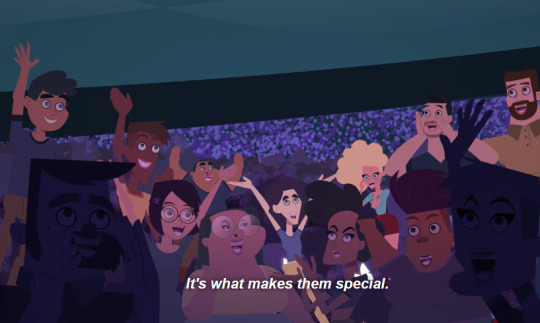
Our heroes also fight non-magical everyday homophobes, who get written with scathing realism.
The moment I knew the show wasn't pulling any punches was in the first episode, where a newscaster complains about being Silenced by the Law of Political Correctness, then chirps "however, we have a special guest who is thankfully above the law!"
According to the reviews I've found from Brazilian viewers, it's also pitch-perfect when it comes to local queer culture, community dynamics, slang and speech patterns, even memes. All of which flies right over my head, so here's a post (with no-context spoilers) about one viewer's favorite details.
The handful of reaction posts on Tumblr have a dramatic split between "Brazilian viewers fiercely defending the show as culturally-accurate, uplifting, and brave in a terrifying political moment" and "American viewers complaining that the show is problematic because it's a comedy about drag queens with no perfect role models and lots of sex jokes."
As the Super Drags tell their nemesis (and this is also in the first episode): "How dare you try to turn the LGBTQXYZ community against each other? We do enough of that on our own!"
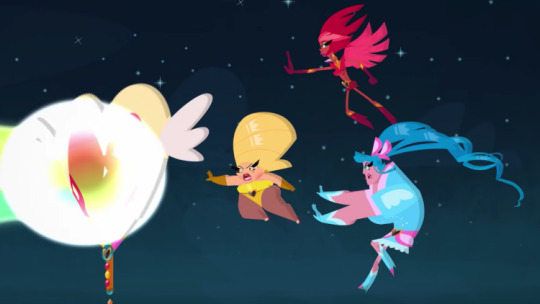
In between missions, our girls work sitcom retail jobs and deal with other everyday problems. All of which are written in amazingly nuanced and thoughtful ways for a show that also features "defeating an orgy monster with a lip-sync battle."
Detailed character stuff!
Our heroes are Color Coded For Your Convenience!
The Super Drags themselves go by "she" in-uniform, and a lot of the time when out of it. Like the Sailor Starlights, only more so. I'll roll with that.
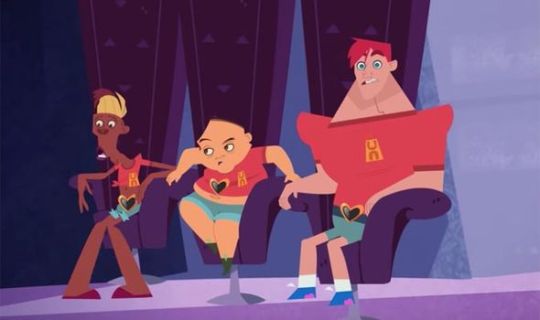
In blue: Safira Cyan, or Ralph by day, an excitable college-age kid who's built like a football player and squees like a fangirl. (She's an anime fan in the original, and for some reason all the otaku references were replaced in the dub, but you can see them in the subtitles.)

Ralph lives with her younger sister (they play video games together!) and their dad, comes out to them mid-series, and is very shippable with another young guy who starts out reciting the homophobic beliefs he was raised with but whose heart clearly isn't in it.
Safira's weapon is a classic magical-girl wand that casts protective force-fields. Which are shaped like condoms. Because of course.
In yellow: Lemon Chiffon, aka Patrick, the oldest of the group and generally the smartest/most strategic. In most cases, the other two treat her as the de facto team leader -- unless she pushes it too far.
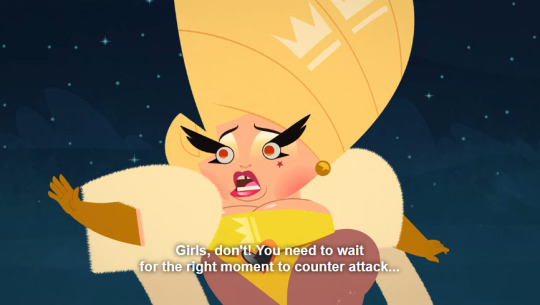
By day she's a single guy with thick thighs and thinning hair, who has some body-image insecurities on the dating scene. And this show has Things To Say about unrealistic beauty standards within the community...not to mention, about masc guys who look down on anyone too flaming or femme because straight people disapprove.
Lemon's weapon is a fluffy boa that can be used as a whip or a lasso, especially when there's a bondage joke to be made.
In red: Scarlet Carmesim, also Donizete, the loudest and most aggressive teammate with the most cutting insults, who refuses to suppress that attitude in an attempt to appease racists. (But will give it a shot when trying not to get fired.)

Donny still lives in her religious/homophobic mom's apartment, and I'm pretty sure it's because neither of them can afford to move out. Her rock-solid sense of fierce self-confidence is the reason it doesn't bring her down.
Scarlet's weapon is a fan that she uses to throw shade. Yeah, you knew that was coming.
The Charlie to these angels is Champagne, who runs operations from a cool magitech compound and breaks the fourth wall at the end to petition for viewers' support in getting a second season.
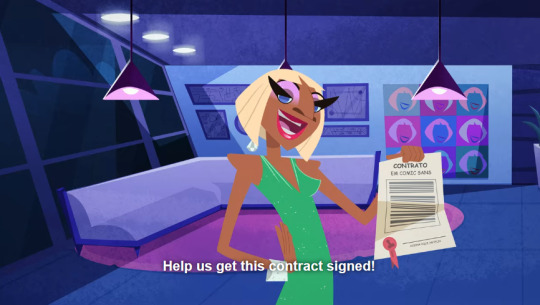
...we let her down, folks :(
So here's a thing. The show never draws a sharp line between "people who become drag queens because it's a way they're driven to express themselves as gay men" and "people who become drag queens because they were trans women all along." That's consistent with how South American LGBT+ culture works. (Again: best of my knowledge, not personally an authority on this, etc etc.)
Many of the characters, including Champagne, never describe themselves in ways that translate to one of our sharply-defined Anglo-USian identity categories. And I'm not going to try to impose any English labels on them here.
But I can say (in contrast to Safira, Lemon, and Scarlet), Champagne never switches out of her "drag" name/voice/presentation, not even in the most candid off-duty scenes, and still has the same bustline when naked in the tub. Make of that what you will.

You Should Watch This Show
If you have a Netflix subscription, watch Super Drags!
If you ever do a Netflix free trial month in the future, make a note to yourself to watch Super Drags!
It's one of their original productions, so there's no risk of missing your chance because the license expired. But it's absolutely not getting the promotion it deserves. Which means potentially interested viewers won't find it, which means Netflix will think there's no interest, which means they'll keep not promoting it...etc etc etc.
No idea if there's any chance of getting it un-canceled, but maybe we can at least convince them to release it on DVD.
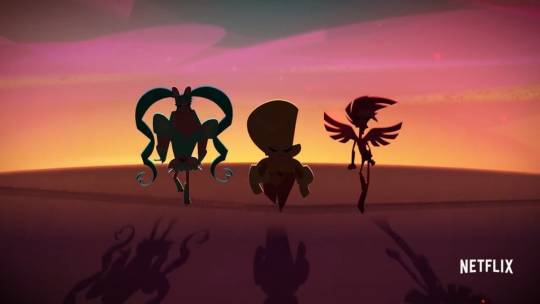
And the sheer gutsiness it took for a group of Brazilian creators to produce this show in the first place -- that deserves to be rewarded with your attention.
In spite of various anti-discrimination laws that sound good on paper, the country has serious problems with homophobia, transphobia, and anti-LGBT violence (warning, article has a violent image which is only partly blurred).
Maybe the creators could've gotten a second season if they made this one softer, less sexually-explicit, more restrained...but honestly? I bet that wouldn't have helped.
Consider Danger & Eggs, an Amazon original cartoon. It was made in the US, thoroughly child-friendly, and restricts its LGBT+ representation to things like "characters go to a Pride celebration...where nobody ever names or describes the quality they're proud of."
And it didn't get renewed past the first season either.
(Note: it had a trans woman showrunner and a queer-heavy creative staff, so I blame all that restraint on executive meddling, not the creators themselves. The showrunner even liked the tweet of my review that complains about it.)
So there's something very satisfying about how Super Drags went all-out, balls-to-the-wall (sometimes literally), all the rep explicit and unapologetic, packing every 25-minute episode with all kinds of queer content that would be censored or muted elsewhere -- but here it's exaggerated and celebrated and just keeps coming.
(...as do jokes like that, and I'm not sorry.)
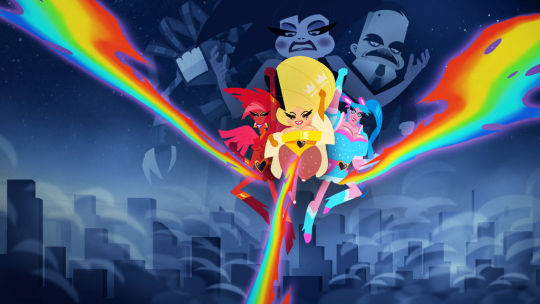
Okay, there are a few legitimate reasons to not watch this show
Some caveats.
None of these things are Objectively Bad Problems that the show itself should be shamed for...but maybe they're genuinely not your cup of tea.
It does have actual Adult Content beyond "the existence of gay people." This show loves to swing barely-clothed cartoon genitalia in your face. There is, as mentioned, an orgy monster. If that kind of humor is going to bother you too much to appreciate the rest of the show, give it a pass.
I wasn't kidding about how realistic the homophobes are. Opening of the first episode has a guy trying to murder a busload of people while shouting slurs at them. If that level of hatred on-screen is gonna crush your soul, even in a show about sparkly queens flying to the rescue with dick-shaped magical weapons, don't push yourself.
Any fiction with this much crossdressing and gender-transgressing is going to hit some trans viewers in a bad way. Because trans people are such a broad group, with so many different experiences, that Every Possible Trope Involved pushes somebody's buttons. (See also: "some trans readers complain about a storyline that turns out to be drawn from a trans writer's actual life experience".) If this show goes does gender things that turn out to be personally distressing for you...or even just distressing for this specific time in your life...don't feel obligated to keep watching.
It has aggressively-sassy queer characters making jokes and calling each other things that are affectionate in-context, but would not be okay coming from straight/cis people. If you can't wrap your head around that, go watch something else.
Other Than That, Go Watch This Show
For all its big heart, big ambitions, and big gay energy, Super Drags is tiny enough that I've binged the whole show 2 times in the past 2 weeks. Thankfully, it's highly re-watchable -- lots of fun background gags and subtle foreshadowing that you don't catch on the first round.
(Pausing one last time to appreciate that a show with elements like "the high-tech robot assistant is called D.I.L.D.O." can be subtle at all, let alone be this good at it.)
I've also paged through all the fanart on Tumblr and Deviantart, looked up the single fanfic on the AO3, and started brainstorming plans to request it in Yuletide next year. Someone, please, come join me in (the English-language side of) the itty-bitty fandom for this ridiculous, glittery, over-the-top, fabulous series.
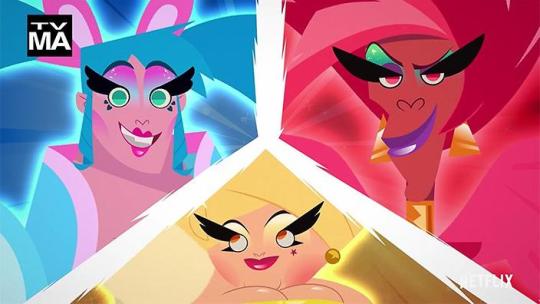
17 notes
·
View notes
Note
(1/6) In advance, sorry if this sounds clipped but I'm rewriting an 11 part ask because that's just too much and it feels like it would be rude to send such a long question. Somehow it's still long. So my background is: mostly used to aro and ace communities, don't have much experience with the lgbt+ community at large (trying to work on that), the way the aro/ace communities break concepts like attraction down really helped me figure out what my orientation was. Questioning my gender now and
(2/6) having a hard time finding resources that help me clarify my feelings instead of making me even more confused. I started researching thinking that they would be similar to aro and ace resources, going to the root of things and saying “What even is attraction, let’s define it” and breaking it down into chunks instead of trying to tackle the whole thing at once (see the split attraction model). Instead I found many lists of labels and pronouns, trans 101 that was at the same time too basic (3/6) and not basic enough, and “Gender is a feeling, masculinity/femininity/androgyny/etc are feelings too, no one can tell you what your gender is but you”. My request isn’t for anyone to tell me what my gender is, I’ll figure that out myself. But I feel I’m lacking the tools to do it. So does anyone have any resources, be they articles/blogs/life experiences and stories written by trans people/etc that breaks things like the feelings of gender as a whole, masculinity, femininity, androgyny,(4/6) agender, and dysphoria down (not coded behaviors or presentation, but what they actually FEEL like. These are the things that I’m most confused about and most want some sort of answer or definition for) in the style aro/ace resources do for attraction/orientation? To figure this out I need some sort of starting point or foothold or anchor for this instead of “it’s a feeling” when I don’t know what that feeling could be. But “Nobody can tell you what you are” sounds much more like defeat(5/6) than freedom to me rn. I’ve heard it said that gender is experienced differently by everyone, and if it’s really just some nebulous unidentifiable feeling that literally cannot be put into words then I can learn to live with the fact I’ll just never understand it, but… it just seems like there HAS to be some sort of commonality in the feeling of gender, the feeling of femininity/masculinity/all the rest that could be prevalent enough to say what that feeling IS and used to help people (6/6) figure out better who they are and who they want to be. For the ones like me who don’t even know what they’re feeling or what they want to be, just that they don’t want to feel like they do now.
Kii says:You’ve got a lot here, and you’re right. Gender is really confusing, and it really is something that 100 different people will give you 100 different answers about. Some people do feel their gender is best described by more visible aspects, such as behaviors, clothing, desired body, hobbies, etc, but some people don’t, and for them, it is just a feeling that isn’t describable, they just know internally what gender they are and can’t always explain why.
However, just because there are feelings doesn’t mean that everyone’s feelings are the same, like the commonality you’re mentioning. You know the old “how do we know that your green is the same as my green?” Two people could be seeing the exact same item, both agree that it’s green, but how does anyone know that if I saw the same item through your eyes, I would still call it green? Your eyes might be structured completely differently than mine. Your green might be my purple, etc. I think the same goes for the words “masculine” and “feminine”- I can give you words that I associate with each, but a lot of people might disagree.
Think of a person that you consider to be very masculine (whether they ID as a man or not)- why do you see them as masculine? Is it because of how they dress? What their body looks like? Because they like cars, sports, etc? How they act or other elements of their personality? Do the same for someone who you feel is very feminine (whether they ID as a woman or not). How is your “masculine” person different than your “feminine” person?
Androgyny is usually described as the intersection or mix of masculinity and femininity, so to figure out what you associate with androgyny, you kind of have to figure that out first.
We have a whole page about dysphoria, since that’s a more concrete concept. There are lots of descriptions there on how different people describe dysphoria and how it feels.
We also have this post, which a lot of people have tried to make helpful to questioning people, as well as this ask where various mods described what gender feels like to them.
Harper Says:I would also suggest a broader understanding of gender (and sexuality). You’re looking for a commonality that is not found uniformly in lived/expressed experiences - perhaps you might find it fleetingly, strangely, but I doubt it will come with much uniform clarity. The assumption that there has to be a commonality, a universality, is one that potentially assumes a (purely) medical/psychological account of gender and sexuality. Experiences of gender will necessarily intersect with other forms of systematic oppression: race, disability, and so on; and so each account of gendered experience has to be uncommon.Try instead understanding gender as part of a wider system of oppression rigged to benefit white cis men. In this, bodies, activities, sexualities, (and many other things) are codified and performed within a system of oppression. This is the way as far as I, and many other thinkers, understand gender. When you ask for gender as “not coded behaviors or presentation, but what they actually FEEL like” I think you misunderstand that gender is easily and always both. The performances, the risks, the transgressions, that commonly make up transgender experiences are inescapably coded behaviours - we don’t live in a society that isn’t oppressive. That is why there is such fear and thrill in a trans woman shaving her legs for the first time, or a trans man using the men’s bathroom for the first time. The emotion and feeling wouldn’t be there if such transgressions weren’t coded in a system of oppression that frowns upon such behaviours. Gender is always on some level something that is done and the doing is bound up with being. To strive for a definition that reduces one to the other or excludes one or the other is as far as I understand it, a misunderstanding, and this is perhaps where your confusion comes from.With this understanding I would then say that it is not very surprising that you’re finding dead-ends and confusion by trying to parse an understanding of gender through split-attraction model type thinking. This is a relatively recent way of thinking about sexuality within the LGBT community, (one that I personally find no stock in), butting up against around thirty years of queer feminist thought, and a whole history of LGBT lives and experiences. You will probably find that trying to think through gender in ace/aro modes of thought is an impossible task without this appreciation of transgender history or an understanding of heterosexuality as the oppressive action of gender.I’m not surprised then, that you find defeat instead of freedom; for many, gender is something that is survived. Freedom can only come with the abolition of gender, that is the end of the “material, social, and economic dominance of men and exploitation of women” (Escalante). So to speak of a commonality, perhaps start reading about how these oppressive systems work. Understanding all of this is not an easy task. Below I’ll feed a few pointers on a theoretical level, and as such can throw up inaccessible language. My hope is that if you do struggle with any of it, from here you can google keywords and hopefully find more sources that suit you better.For the theoretical exploration of such see: Judith Butler’s Gender Trouble, and Monique Wittig’s The Straight Mind and Other Essays (see One is Not Born a Woman - I haven’t yet managed to find a pdf for the whole book). Or key words: material feminism, Butler, gender performance, heterosexuality, the straight mind. CW: (this will be quite broad but I know Wittig talks about:) pornography, sexual harassment, slavery.For an account of gender which explores these concepts see Susan Stryker’s My Words to Victor Frankenstein…. In this Stryker mixes a lived personal experience with gender as a trans woman alongside theoretical musings. Key words: transfeminism, transgender studies, transgender rage. CW: surgery, suicide, TERF stuff, pregnancy, birth.I would also recommend investing yourself in transgender voices and histories, so you can see how a varied approach to gender throughout history has been undertaken and lived. How complexities and contradictions have been embodied and embraced complexly by trans individuals. See Paris is Burning for what has become an important moment in LGBT cinema and history. CW death, accounts of violence, mentions of surgery, talk about sex.Also check out One From the Vaults a trans history podcast by Morgan M. Page. (Also available on iTunes, etc. I think.) In this engrossing podcast, Page tells the stories of various trans - or at least gender transgressive - people throughout history, including clips of them, letters, interviews, etc.. It comes with “all the dirt, gossip, and glamour from trans history” and so shows the variety of our trans ancestors throughout history, good and bad, happy and sad; encompassing all different ways of doing gender and different ways of being.In terms of your own personal questioning of gender, I would do as I advised here. Do gender: evoke man, evoke woman, evoke neither. Try things out, see what you feel. Explore yourself and your own embodiment and explore the feelings that arise out of this. At the end of the day, gender isn’t something that originates from books and articles, it is lived and done out in the world.I wish you the very best on your journey!
#harper says#Anonymous#kii says#caps#what is gender#wittig#butler#split attraction model#transfeminism#long post#questioning#trans history#trans media
178 notes
·
View notes
Text
This is a potentially unpopular opinion that I’m still forming...
So it seems to me that it’s way more acceptable in queer circles to explore gender outside of the traditional models, like with xenogenders and neurogenders which don’t relate themselves at all to a binary or even to anything else we think of when we think of gender, like traditional roles or expression.
But meanwhile, there’s almost a backlash if anybody’s against the idea that the most influential part of attraction is gender. Paraphilias are constantly shot down as being sexualities despite the fact that they are descriptors of sexuality and of recipients of attraction, for example. Obviously sapiosexuality has a long history of being used as a tool of ableism, but it seems that the next biggest criticism is that if gender is less important that other traits, it would be homophobic (queerphobic) not to identify as an explicitly mspec orientation.
That last bit has always seemed to me like a kind of respectability politics. Like “until we’re accepted, you’re not allowed to deviate from either our side or the normative side.” Much like the insistence that all non-cis people must be trans. It’s a very “power in numbers” deal that halts any possible discussion of better models.
Like I’ve said before, I feel like non-gendered attraction terminology would be useful to a wide variety of people, like kinksters who are attracted to compatibility, or neurodivergent folks who are attracted to compassion or shared experience. And every single time, I see people peddling the “if gender doesn’t matter, just say pan” thing. Which strikes me like “if you don’t have a gender, just say agender” thing--a cop-out option that straight-up doesn’t match all peoples’ feelings. And even besides the fact that gender can matter but may not be as influential as other qualities, the existing language of orientation just doesn’t specify those things that the individual might be trying to communicate or--god forbid, since identity crises are incredibly difficult--conceptualize.
It seems to me like most mogai identities are genderqueer or aspec. And we’ve already established that gender is more widely accepted as a construct that can be performatively and politically warped into rightful meaninglessness. With regards to aspec identities, I think they also break a really nice mold; the community popularized the concept of split attractions, and those who experience their attractions this way often understand that the categories they exist in are also blurry social constructs--just look at the whole concept of alterous or queerplatonic attractions/relationships.
So now I’m getting to what I actually want to say which is... I feel like the fact that people are so adamant to staying within the attraction-is-gender-and-only-gender model is the same reason why REG’s focus on SGA as the one true queer qualifier, with trans as an afterthought. I think the prioritization of orientation politics over gender politics is the heart of why aspec and non-binary folks get a wider leash to create innovative language, but mspec(? non-traditionally LGBT?) folks don’t.
People are terrified by the very concept that sexuality can mean anything other than orientation. The sentence “my sexuality is kinky” literally makes sense in that the word sexuality not only relates to orientation label (hetero-/homo-/bi-/etc sexual) but also sexual interests like paraphilias, sex practices, fantasies, monogamy/polyamory, etc. And yet if you dare phrase it that way, ten million thoughtless nobodies will come crawling out the the bushes, claiming you’re calling kink a sexuality (as in a countable noun, like homosexuality or any of the other laundry list sexualities are). Like I literally wrote a post about this phenomenon today of conflating sexuality (like human sexuality) with sexuality (like queer orientation label).
And it just seems like the apprehension that people have towards the idea of non-gendered orientations... is ultimately just “this is the most important issue to us, so don’t make it weird, but go ahead and taint any of those other lesser issues.” And I understand this train of thought--I really do; it’s such a slippery slope to start branching out and publicly claiming new ground. Like... even I don’t think it would be necessarily the best thing right now to actually create the new terminology. But I am incredibly interested in why it’s considered such a despicable thing to even conceptualize it.
This is all my perception. I could be wrong. And in fact, I’d be super interested if other queer theorists had their own insights into the “why is orientation locked into gender?” question. Because this has been on my mind for a while and even if it’s all abstract theory with no praxis, I think it could be a worthwhile discussion.
#personal#long post#human sexuality theory#ramblings#social commentary#paraphilias#sexuality#orientation#queer theory#queer#mogai
14 notes
·
View notes